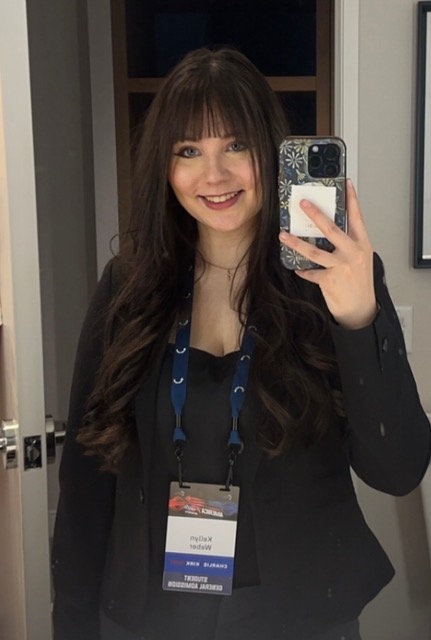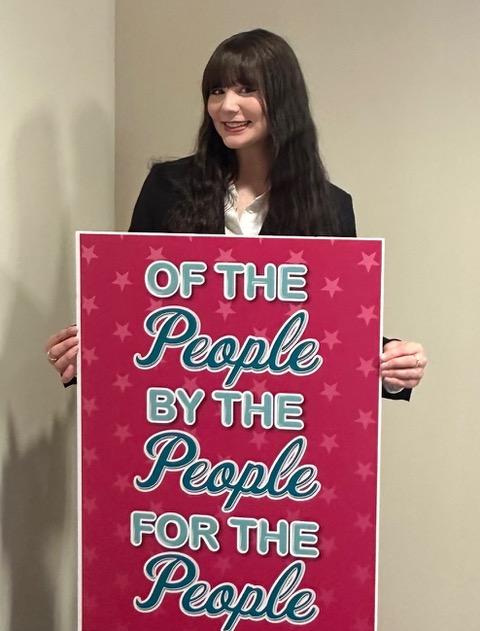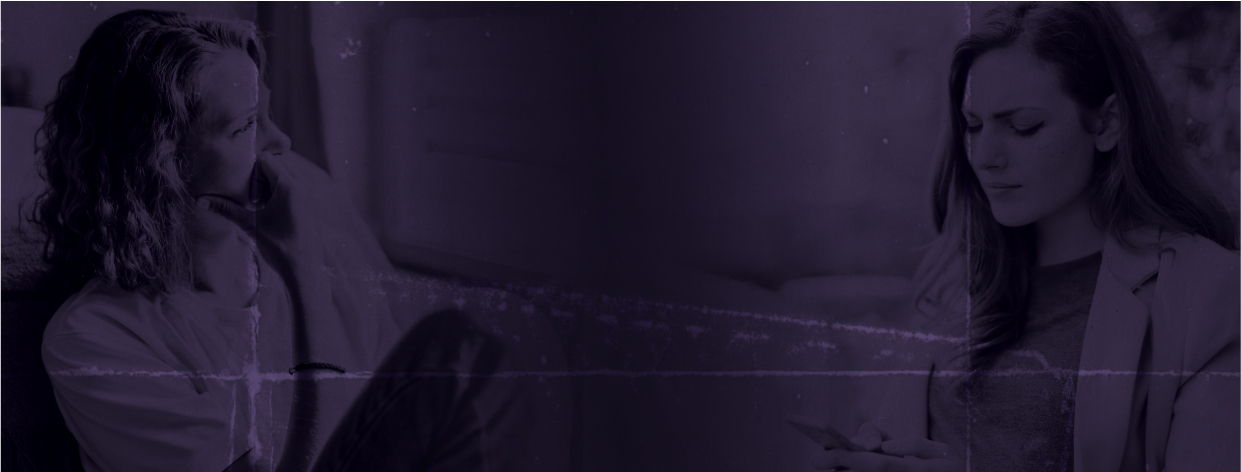It’s an increasingly all-too-common plight: a free-thinking young woman can struggle to find connection and community among peers who would rather conform to social pressure and allow friendships to disintegrate because of political differences. In particular, young conservative women on college campuses today feel the potential — and the risk — of every conversation, every chance to belong to someone or something.
So when Kellyn Weber received a bid from sorority Alpha Omicron Pi at Shippensburg University in 2024, she was overjoyed. These women promised sisterhood — a bond that Weber thought transcended political opinions, and a place where she could be fully herself, even if she didn’t always see eye to eye with everyone in the house.
But that promise was soon broken after the sorority revoked her bid over her political beliefs.

Weber told IW Features that she was raised in a “fairly conservative household,” but noted that although her parents considered themselves Republicans, “they didn’t push anything on me.”
In fact, Weber said her political awakening happened not around the family dinner table, but online. During the early days of the COVID-19 pandemic in 2020, when Weber was in eighth grade, she began sharing her conservative views on social media. Unfortunately, this worsened the stark isolation she already felt due to COVID-19 restrictions.
Weber found some refuge in Air Force Junior Reserve Officers’ Training Corps (ROTC), where “they were able to ignore my political views,” though relationships were more professional than personal. By and large, however, her formative years in middle and high school were lonely — “very lonely,” she admitted, “without getting too emotional”— in no small part because her beliefs ran counter to the mainstream.
When it came time to choose a college, Weber said she was drawn to Shippensburg University in Pennsylvania for its Army ROTC program, suite-style dorms, and peaceful setting. The school was far from the hustle of city life in New Jersey, and the rural environment reminded her a bit of home, where she grew up surrounded by farm animals.
“I wanted something quiet and familiar,” she said.
Initially planning to commission as a second lieutenant, Kellyn later pivoted toward a career in politics, saying it’s her dream to work for the conservative non-profit organization Turning Point USA. She even helped found a Turning Point USA chapter on Shippensburg’s campus.
The one thing Weber was always sure about was joining Greek life on campus.. Alpha Omicron Pi (AOPi) was especially appealing to Weber because the sorority’s philanthropy supports veterans.
But word had already started to get around about Weber’s role with Turning Point USA’s new chapter.
“I received quite a few death threats… violence threats from people anonymously,” she said.
Weber admitted that the threats shook her confidence. So instead of participating in formal sorority rush, where potential new members are ranked by sororities after in-house events, she opted for Continuous Open Bidding (COB) — a more informal, coffee-date style recruitment.
When she met with girls from Alpha Omicron Pi (AOPi), Weber said the house “just felt like the right fit.”
“They told me my political activism wouldn’t be an issue,” Kellyn recalled. “They even said some of the girls were conservative too.”
After a warm, two-hour coffee date, the women of AOPi offered her a bid the same evening.
But the next night, she got a call from an AOPi chapter leader. The sorority’s national advisor had reviewed her social media and reportedly found her posts “concerning.” They specifically cited a post of Weber’s quoting former United States Secretary of Housing and Urban Development Dr. Ben Carson, who once stated, “Aren’t you glad that corporations are seeing that DEI needs to DIE?”

Other posts AOPi took issue with centered on Weber’s criticisms of Diversity, Equity, and Inclusion (DEI) policies, particularly equity quotas in hiring and college admissions. According to AOPi’s national website, the sorority states, “as one of our five AOII Ends, Diversity, Equity, and Inclusion (DEI) is an integral part of our values as an organization, but also a part of what we do in our collegiate chapters and in the international organization.”
Weber, in contrast, believes DEI initiatives undermine meritocracy.
“We want America to be diverse. It’s the ‘equity’ part that is a problem,” she said. “Equity is being used to say that when I apply for a job, that corporation is choosing people based on race, not qualifications.”
To Weber, her philosophy all comes down to opportunity: “Conservatives believe that everyone should get to the starting line. Democrats think everyone should cross the finish line at the same time.”
On the call with sorority leadership, Weber explained that her personal posts represented her personal beliefs and no one else’s. The tone quickly shifted, she said. “They said the things I post would represent the sorority as a whole,” Weber recalled.
The chapter leader allegedly told her: “This is our way of saying the posts need to come down.”
Weber then made a painful decision.
“Against my better judgment, I said I would take the posts down,” she admitted, “because I really wanted friends. That was it.”
However, the damage had been done. Weber was refused the chance to sign the legal paperwork (the MRABA, or Membership Recruitment Acceptance Binding Agreement) that would have formalized her membership.
The next day, she received a final phone call: Alpha Omicron Pi was revoking her bid entirely due to her social media presence.
In response, Weber took to the media, penning an article for The College Fix called, Sorority Leaders Didn’t Like My Anti-DEI Posts on Social Media, So They Disinvited Me.
Weber said the backlash was swift in the days and weeks that followed.
“I’ve received quite a few anonymous threats,” she said. “People saying, ‘See where it gets you to say DEI should die.’”
She asserted that she often gets double-takes around campus, and that she suspects people immediately know she’s the one who wrote The College Fix article.
Even amid the hostility, however, Weber noted there were signs of grace. One president from another sorority reached out to apologize for what Weber had been through, affirming that “this is not what Greek life is supposed to be.”
Though she still hasn’t had a chance to engage in Greek life, Weber’s role in Shippensburg’s Turning Point USA chapter has continued to grow, as has the chapter itself. With 25 members, the group has become a solace for Weber and other like-minded students on campus — especially since there was no conservative club at Shippensburg prior to its launch.

“We had a Democratic Socialists club, but nothing for people like me,” she said. “If I hadn’t started it before the sorority incident, I probably would have broken down. But this chapter gave me a place to belong.”
She’s not alone. According to the Chronicle of Higher Education, Turning Point USA has seen a sharp rise in active chapters over the past five years, growing from around 150 in 2018 to more than 3,500 today. The organization’s revenues increased from $4.3 million in 2016 to $81.7 million in 2023.
The appeal? For students like Weber, it’s about finding people who will embrace them fully, including their beliefs.
“It’s easy to say ‘be yourself,’” she said, “but it’s harder to live it — especially when people treat your beliefs like a disease.”
Whether it’s media, advocacy, or eventually running for office, Weber said she is exploring how to turn her passion into a career. “I want to help create spaces for people who feel like they don’t belong,” Weber said.
And while she still wrestles with the sting of rejection, she’s not bitter. “I don’t hate the girls in the sorority,” Weber said. “I just think they were scared — scared of what people would think, of getting in trouble for associating with me.”
In the end, Weber achieved just what she’d aimed for. “I wanted friends,” she repeated, her voice unapologetic and unwavering. “And I’ve finally found them. Just not where I thought I would.”











